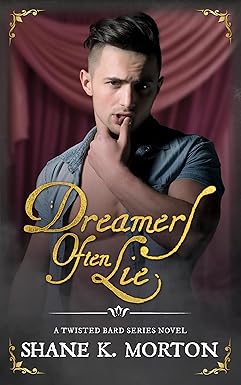 Dreamers Often Lie
Dreamers Often Lie Twisted Bard
m/m, fantasy
self
10/4/24
Kindle
129
Amazon

Amazon Link: amazon
Two houses both alike in dignity...
The Monty Boys and the Cappie Boys have been the main escort services in Los Angeles for years. Their rivalry has led to bloodshed and anger from both sides. But two men are bound to shatter the enmity that lies between them. Hint: It's not Roam and Jules.
Ty has been forced into a life of servitude ever since he came to live with his uncle. His shame makes him quick to anger.
Merc chose a life with the Monty Boys when his own home life became too much of a burden. He has thrown himself into his new role, providing pleasure to his high-end clients with an unrivaled revelry.
They may hate each other - but they can't help what they feel.
Besides, Roam and Jules suck all the air out of the room when they're present. They're too involved in being influencers and insta-whores between their clients and their own forbidden secret love.

Review By Ulysses Dietz
Member of the Paranormal Romance Guild Review Team
Amazon Link: amazon
I loved this book. Having been traumatized by Romeo and Juliet in high school, I was even more traumatized by Franco Zeffirelli’s 1968 film, which I saw at thirteen. The young Leonard Whiting who played Romeo was probably the first glimpse of a naked boy I’d ever had. Some people carelessly call this most famous play by the Bard a romance, but it really is a tragedy of ill-fated love.
And that’s where Shane Morton comes in with his addition to the Twisted Bard series. It’s an homage and a critique of the original play—the critique being mostly about the avoidability (I made that up) of the tragic finale. In the spirit of that critique Morton has given a contemporary setup infused with very modern notions, the most central of which is the Internet and social media as a driving force of youth culture in the world today.
The Capulets and the Montagues are no longer two families of Verona in Renaissance Italy, but two competing gay porn studios in Los Angles, run by one-time lovers turned enemies Poppa Cappie and Daddy Monty. Each man has a stable of gorgeous boys who perform in his films, but who also drive their brand by posting online and racking up followers and likes on social media. The current situation is that the “houses” of boys have become too well-known for their public scuffles, sometimes violent, and the mayor of Los Angeles has made it clear that the violence has to stop, or else.
The dark twist here is that Cappie and Monty exploit their young men beyond any measure of personal agency, having attracted runaways from abusive families with promises of shelter and long-term security. It’s not just about making porn flix, but about requiring their charges to act as escorts. Morton makes sure to clarify that this isn’t a diatribe against sex work, but against the harsh reality of the boys being pimped out that is trafficking. The public brand of Cappie and Monty as liberated troupes of modern, sensual performers is belied by the fact that the boys often feel like they’re prisoners, and also feel unsafe to object to anything they’re asked to do.
This includes Merc and Roam on the Monty side, with Ty and Jules on the Cappie side. You can see which characters from the original play they represent, and the big difference is that Merc and Ty, standing in for Shakespeare’s Mercutio and Tybalt, do not die in order to trigger the rest of the story. Indeed, in the wake of a public confrontation, the entire story unrolls through the alternating viewpoints of Ty and Merc, who fall in love with each other just as Roam and Jules do. Shakespeare’s plot is followed loosely, just enough to set the stage, as it were, for a very different story.
We know right away that this drama is not going to turn into a tragedy—at least not IRL. Instead, Morton uses the plot to look at the pitfalls of an industry aimed at vulnerable young men and offering them exploitation and servitude rather than freedom from want and fear.
Like all good m/m romances, there’s plenty of physical intimacy described in great detail (it is about the porn industry, after all); but more importantly, it’s about these four young men, especially Ty and Merc, who ponder their fate and their past, and decide how they might seek freedom from the close community that both protects and imprisons them.
The writing is light and bantering, capturing the language and habits of young men familiar to all of us from Hollywood and the music industry. Beneath it, Morton puts plenty of pain and sorrow and helps us feel the very hearts of his four heroes.
